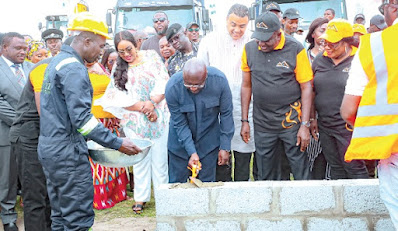The Vice-President, Dr Mahamudu Bawumia, has said the government is working on a policy to give Faith-Based Organisations (FBO) that meet a particular threshold in terms of provision of social services, some incentives to empower them.
He acknowledged the enormous roles FBOs continue to play in the area of education, health and care for persons with disability, among others, to improve the standard of people in society.
Dr Bawumia announced this last Saturday during a sod-cutting ceremony for work to begin on a 2,000-acre, 9,000-home Integrated Community and Empowerment Centre for Persons With Disability (PWDs) at Agortor-Kope in the Osudoku Traditional Area of the Greater Accra Region.
Intervention
Known as the Charismatic Evangelistic Ministry (CEM) Ability Village, the enclave is designed to support and empower PWDs skills training and specialist health care to promote their full participation in all facets of society. The first phase of the project covers an area of 200 acres and is expected to cost $85.3 million. The project will be funded through donations, corporate and international donor contributions as well as by individual philanthropists.
Project
The CEM Ability Village will have an Empowerment Centre to provide Technical and Vocational Education and Training (TVET) and other skills training to address the employment challenges of PWDs, an ultra-modern hospital to cater for the specific needs of PWDs, as well as a technology centre to focus on software development and hardware assembly, and repair.
It will also have an advocacy, counselling, guidance and information service; assisted living and affordable housing support and support for PWDs to venture into agriculture.
Commendation
Dr Bawumia commended the leadership of the church for conceiving and undertaking such a major project. "I am clear in my mind that faith-based organisations who provide so much in the areas of education, healthcare and looking at the needs of PWDs must be provided special attention and incentives by the government to empower them to continue to provide these services to our dear country," he said.
Dr Bawumia noted that PWDs faced a variety of social, attitudinal, physical, educational, transportation and communication barriers in their everyday lives which affected their full inclusion in society. Those barriers, the Vice-President said, resulted in negative consequences such as social exclusion, physical and mental health challenges, discrimination, stigmatisation, low self-esteem and financial difficulties.
Marginalisation
The Chairman of the Board of Trustees of CEM Ability Village, Rev. Dr Steve Mensah, said PWDs in Ghana had been marginalised and their situation prompted the church to support them every year with the provision of basic needs and free medical services. He said the idea of an empowerment centre was to institutionalise the support of CEM offered PWDs to enable them to fulfil their dreams and aspirations in order to contribute meaningfully to society.
The Paramount Chief of the Osudoku Traditional Area, Nene Aadegbor Ngmongmowuyaa Kwesi Animle VI, in a speech read on his behalf, commended the CEM for extending the project to the area which would contribute to the opening up of the area for development.
The Executive Director of the Ghana Federation of Disability Organisation, Rita Kusi Kyeremaa, said PWDs constituted about 8 per cent of Ghana's current constitution who unfortunately continued to have limited access to services in terms of health, education, employment and other services.






.jpg)






